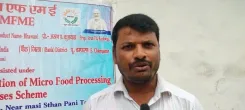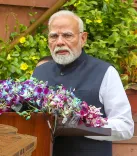Is Jabil's Investment of Over Rs 2,000 Crore in India's Manufacturing Sector a Game Changer?

Synopsis
Key Takeaways
- Jabil is investing over Rs 2,000 crore in India.
- The new plant in Sanand focuses on silicon photonics.
- The investment is expected to create over 44,000 jobs.
- Jabil serves over 300 major brands globally.
- The Telecom PLI Scheme aims to boost local manufacturing.
New Delhi, July 26 (NationPress) The nearly finished plant of Jabil in Sanand, Gujarat, is set to revolutionize India's manufacturing landscape, as stated by Minister of Electronics and IT, Ashwini Vaishnaw. This facility will focus on the production of silicon photonics and various electronic products within the nation.
With over 140,000 employees spread across 100 locations in more than 25 countries, Jabil stands as a global manufacturing giant.
“The company is investing over Rs 2,000 crore in the manufacturing of Silicon Photonics and Electronic Manufacturing Services here in India,” Vaishnaw mentioned in a recent update on the X social media platform.
He added, “The Sanand plant is nearing completion.”
Notably, Jabil serves an impressive roster of 300 of the world's largest brands, spanning sectors from healthcare and packaging to smartphones, cloud equipment, automotive, and home appliances.
In related news, the Central government has reported disbursements of Rs 1,162 crore under the Telecom Production-Linked Incentive (PLI) Scheme until March 31, as per the Department of Telecommunications (DoT).
This initiative, launched on April 1, 2021, aims to enhance domestic manufacturing and self-reliance in the telecom industry and is expected to conclude by the end of the current financial year.
Among the 42 companies shortlisted for the scheme, 21 manufacturers have successfully received their incentives to date. The government allocated Rs 4,115 crore for this scheme, aiming to generate an estimated Rs 2.45 lakh crore in additional sales and create over 44,000 new jobs during its duration.
Jabil has emerged as a leading beneficiary, receiving Rs 235.87 crore in incentives over two financial years. Other significant beneficiaries include Flextronics (Rs 165.12 crore), Nokia (Rs 157.32 crore), Foxconn’s Rising Stars (Rs 80.33 crore), and Syrma SGS (Rs 53.23 crore).
Industry analysts emphasize the necessity for stronger collaboration between telecom operators and the government's vision, highlighting the importance of promoting the procurement of telecom products with greater local value addition to genuinely support the objectives of self-reliance and job creation.









